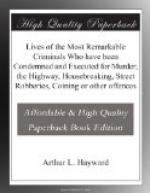Charles Weaver, of whom we are now speaking, was the son of parents in very good circumstances in the city of Gloucester, who put him apprentice to a goldsmith. He served about four years of his time with his master, and having in that space run out into so much lewdness and extravagance that his friends refused any longer to supply or to support him, he then thought fit to go into the service of the Queen, as a soldier, and in that capacity went over with those who were sent into America to quell the Indians. These people were at that time instigated by the French to attack our plantations on the main near which they lay. The greater part of these poor creatures were without European arms, yet several amongst them had fusees, powder and ball from the French, with which, being very good marksmen, they did abundance of mischief from their ambuscades in the woods.
At the time Weaver served against them, they were commanded by one Ouranaquoy, a man of a bloody disposition, great courage and greater cunning. He had commanded his nation in war against another Indian nation, from whom he took about forty prisoners, who according to the Indian custom were immediately destined to death; but being prevailed upon, by the presence of the French, to turn his arms against the English, on the confines of whose plantations he had gained his last victory, Ouranaquoy having sent for the prisoners he had taken before him, told them that if they would fall upon a village about three miles distant, he would not only give them their liberty, but also such a reward for the scalp of every Englishman, woman or child, they brought. They readily agreed on these terms and immediately went and plundered the village.
The English army lay about seven miles off, and no sooner heard of such an outrage committed by such a nation, but they immediately attacked the people to whom the prisoners belonged, marching their whole army for that purpose against the village, which if we may call it so, was the capital of their country. By this policy Ouranaquoy gained two advantages, for first he involved the English in a war with the people with whom they had entertained a friendship for twenty years, and in the next place gained time, while the English army were so employed, to enter twenty-five miles within their country, destroying fourscore whites and three hundred Indians and negroes. But this insult did not remain long unrevenged, for the troops in which Weaver served arriving immediately after from Europe, the army (who before they had done any considerable mischief to the people against whom they marched, had learnt the stratagem by which they had been deceived by Ouranaquoy) returned suddenly into his country, and exercised such severities upon the people thereof that to appease and make peace with the English the chiefs sent them the scalps of Ouranaquoy, his three brothers and nine sons.




